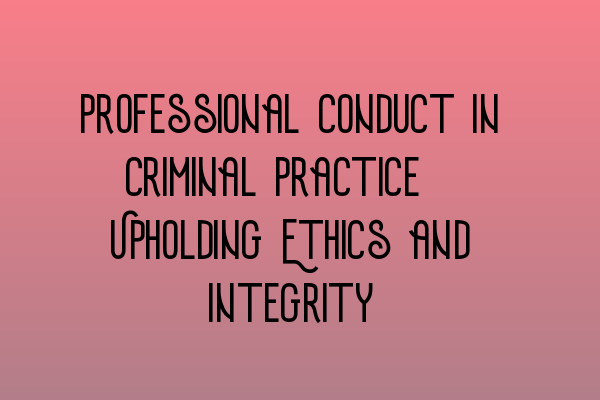Professional Conduct in Criminal Practice: Upholding Ethics and Integrity
Welcome to the SQE Criminal Law & Practice Law UK blog! In this article, we will delve into the vital topic of professional conduct in criminal practice, emphasizing the importance of upholding ethics and integrity in the legal profession. As a leading provider of legal education and training, SQE Criminal Law & Practice Law UK is dedicated to empowering aspiring lawyers with the knowledge and skills necessary to navigate the complex world of criminal law.
Before we delve deeper into the key aspects of professional conduct, let’s take a moment to understand the meaning of certain important keywords:
Essentials of Consideration: Understanding the Backbone of Contracts
Mistake in Contract Law: Unraveling the Impact on Agreement Validity
Counter-offers: The Art of Negotiating in Contract Law
SQE Workshops on Contract Law: Strengthening Your Knowledge and Skills
Deconstructing Exclusion Clauses in Contracts: What You Must Know
The Role of Ethics and Integrity in Criminal Practice
Ethics and integrity form the foundation of the legal profession. In criminal practice, it becomes even more critical as lives and liberties are at stake. As legal professionals, we are entrusted with upholding justice and ensuring a fair trial for all individuals involved. Upholding these principles is crucial to maintain the public’s trust in our legal system.
By adhering to ethical standards, criminal lawyers demonstrate their commitment to justice, fairness, and the rule of law. This commitment extends to your clients, the court, and the legal profession as a whole.
Understanding the essentials of consideration in contract law is paramount for criminal lawyers as it provides a solid framework for analyzing and evaluating legal agreements. To explore this topic in detail, you can refer to our article on Essentials of Consideration.
Mistake in contract law can have significant implications on the validity of an agreement. As criminal lawyers, understanding the impact of mistakes is crucial when advising clients and building a strong defense. To gain a deeper understanding of mistake in contract law, we recommend reading our article on Mistake in Contract Law: Unraveling the Impact on Agreement Validity.
Adhering to Professional Conduct Rules
As criminal lawyers, it is vital to adhere to the professional conduct rules with utmost diligence. These rules provide guidance on ethical behavior and professionalism, ensuring the highest standard of legal practice. Violating these rules can lead to severe consequences, including disciplinary actions and damage to your professional reputation.
In contract law, the art of negotiating is often manifested in counter-offers. Understanding the intricacies of counter-offers is essential for criminal lawyers dealing with plea bargains and negotiation tactics. To enhance your knowledge on this subject, we recommend reading our article on Counter-offers: The Art of Negotiating in Contract Law.
At SQE Criminal Law & Practice Law UK, we offer SQE workshops on contract law to strengthen your knowledge and skills in this area. These workshops provide practical insights, case studies, and interactive sessions to enhance your understanding of contract law. To learn more about our SQE workshops, visit our dedicated page on SQE Workshops on Contract Law.
Your expertise in criminal law should also extend to contract law, as contracts play a crucial role in various criminal proceedings. Deconstructing exclusion clauses in contracts is a skill every criminal lawyer must possess to ensure the protection and rights of their clients. You can find comprehensive information on this subject in our article on Deconstructing Exclusion Clauses in Contracts: What You Must Know.
By upholding professional conduct, criminal lawyers demonstrate their dedication to their clients, the court, and the legal profession. It enhances your credibility, builds relationships of trust, and contributes to the broader goal of achieving justice.
